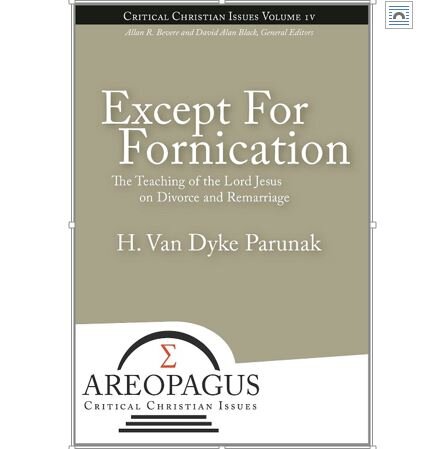This book very clearly presents an alternative view on the topic of the teaching of the Lord Jesus on Divorce and Remarriage. I must acknowledge right from the beginning that Van Parunak is a personal friend and someone who shares my convictions regarding church government — so my objectivity in this analysis might be open to question. But his credentials as a Biblical scholar and a Hebrew scholar in particular are impeccable. I have used his materials throughout my sermon series on the book of Isaiah to great benefit.
This topic has certainly been a thorny one for Christian pastors — given the increasing practice of both divorce and remarriage in all types of church contexts. As Parunak wisely advises: “Long ago, a wise Bible teacher counseled me and other young men who hoped to serve the church of God, ‘Be sure to figure out in advance what you believe about divorce and remarriage. Sooner or later, you will have to counsel people who are embroiled in this tragic situation. It’s far better that you figure out what you believe now, while you can be objective with the Scriptures, than when you are deeply immersed in the emotional trauma of those you love.’” But having recognized that, at whatever stage you find yourself in Christian ministry, you still need to be open and submissive to what the Bible has to say on the subject.
Parunak walks the reader through some of the problems and contradictions that must be faced by those who have adopted some of the more traditional views of the “exception clause” in Matt. 5:31-32; 19:9. In some cases, it would seem to be to the husband’s advantage to drive his wife to commit adultery if his ultimate goal is to be blameless in the Christian community in pursuing remarriage. That would somehow put him on better footing to chase his dreams than if they broke up simply over “irreconcileable differences” regardless of who was the more obstinate partner. Case situations like this one raise some perplexing questions.
For those whose biblical conviction has been that only death breaks the marriage bond and allows for remarriage, the options regarding the “exception clause” have been somewhat limiting. I am most familiar with the following proposals:
-
understanding the fornication clause to deal with a woman who is found not to be a virgin on her wedding night
-
understanding the fornication clause to refer to incest, a very specific form of fornication
But neither of these have proven very satisfying.
Parunak carefully deals with the relevant biblical texts and the associated problems and questions that must be addressed and develops a position that from my study is both new and compelling (although he does not claim to be the originator of this position). It is helpful to buy the paperback book (sold by Amazon) which is the shorter version of his longer treatise that he makes available for free on his website. This is essential reading for those who truly want to wrestle with the biblical understanding of this crucial issue.

